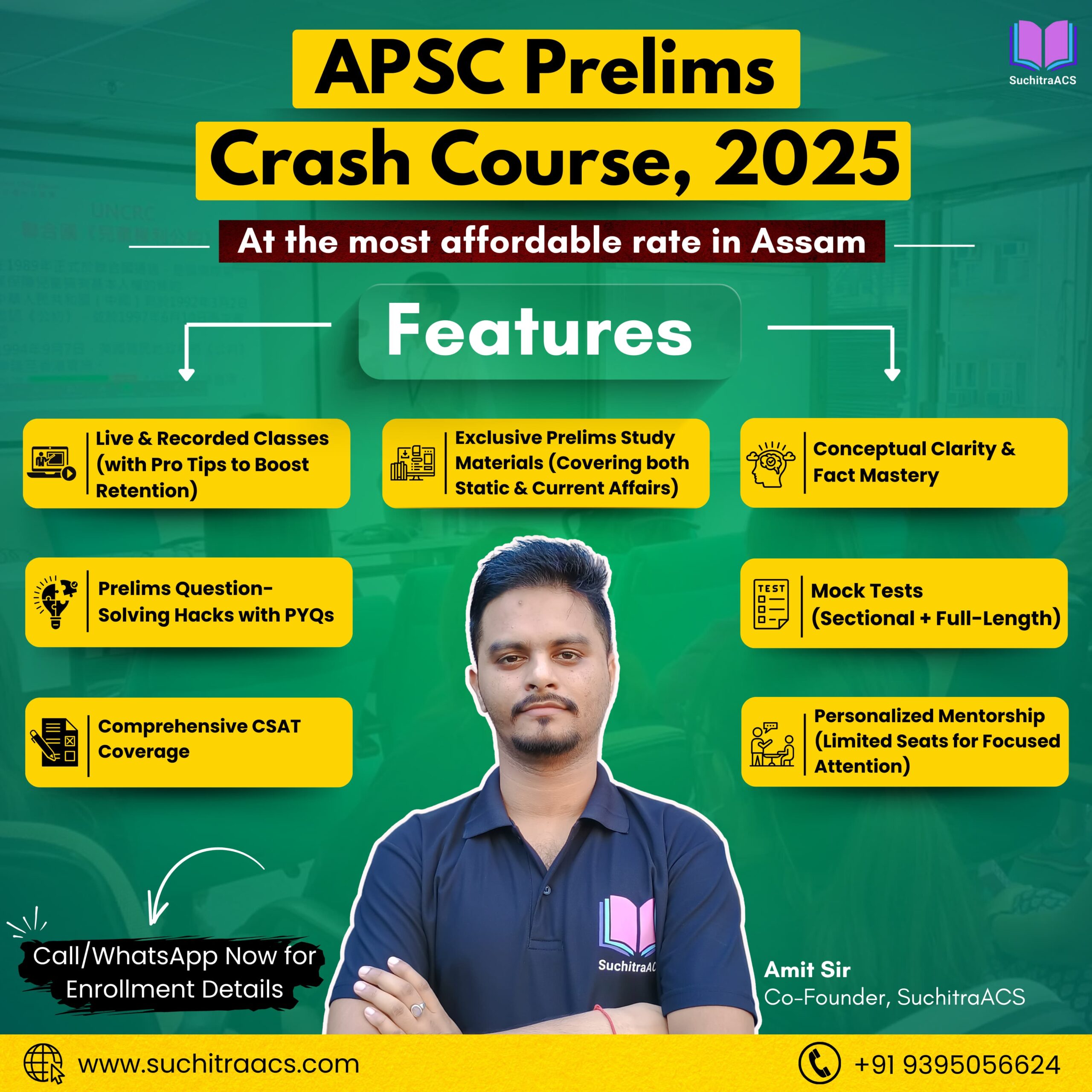APSC MCQs / APSC Prelims Practice Questions based on Assam Tribune (Daily) – 24/04/2025
For APSC CCE and other Assam Competitive examinations aspirants, practicing Daily MCQs is vital. This blog covers most important Prelims questions from the Assam Tribune today (24-4-2025). These issues are key for both APSC Prelims syllabus, offering insights into the important topics of current affairs.
✨ Current Affairs Crash Course for the APSC Prelims 2025

APSC MCQs / APSC Prelims Practice Questions (Date: 24/04/2025)
🌊 Topic 1: Suspension of the Indus Waters Treaty (IWT)
Q1. With reference to the Indus Waters Treaty, consider the following statements:
- The treaty was brokered by the United Nations in 1960.
- India has exclusive rights over the waters of the Ravi, Beas, and Sutlej.
- The treaty can be unilaterally revoked by either country.
Which of the statements is/are correct?
A. 2 only
B. 1 and 2 only
C. 2 and 3 only
D. All of the above
✅ Answer: A
🧠 Explanation:
- Statement 1 ❌: The treaty was brokered by the World Bank, not the UN.
- Statement 2 ✅: India has exclusive rights over the three eastern rivers—Ravi, Beas, Sutlej.
- Statement 3 ❌: The treaty does not allow unilateral revocation; any change must follow arbitration or dispute resolution mechanisms under its provisions.
Q2. The SAARC Visa Exemption Scheme, recently suspended for Pakistani nationals, allows:
A. Free movement of all citizens within SAARC
B. Journalists, MPs, and businessmen to travel visa-free across SAARC countries
C. Military personnel to conduct border visits
D. Only cultural and sports delegates to access other countries without visa
✅ Answer: B
🧠 Explanation:
The SAARC Visa Exemption Scheme permits visa-free travel to select categories (e.g., journalists, MPs, businesspersons) within SAARC, not the general public.
🧬 Topic 2: Assam’s DNA Profiling Lab
Q3. The establishment of a DNA profiling lab helps in:
- Speeding up conviction in sexual offence and murder cases
- Forensic identification during disasters
- Creating genetic databases for population studies
A. 1 and 2 only
B. 2 and 3 only
C. 1 and 3 only
D. All of the above
✅ Answer: A
🧠 Explanation:
- Statements 1 & 2 ✅: DNA profiling helps both criminal justice and disaster victim identification.
- Statement 3 ❌: Creating population-level genetic databases is not the core purpose of forensic labs and poses ethical/legal concerns without specific law.
Q4. Which of the following is true regarding the DNA Technology (Use and Application) Bill, 2019?
A. It has been passed and is now a law.
B. It regulates the use of DNA for agricultural biotechnology only.
C. It proposes safeguards for DNA data collection and profiling in criminal cases.
D. It allows public access to all DNA records for transparency.
✅ Answer: C
🧠 Explanation:
The DNA Technology (Use and Application) Bill, 2019 is pending in Parliament and aims to regulate DNA use for forensic and criminal investigation, including setting up a DNA Regulatory Board. It does not allow open public access to DNA data.
🤖 Topic 3: Regional AI Skill Centre in Assam
Q5. Consider the following initiatives:
- Digital India Bhashini
- Skill India Mission
- FutureSkills PRIME
- Start-Up India
Which of the above are directly relevant to the AI Skilling Centre announced in Assam?
A. 1, 2 and 3 only
B. 2 and 4 only
C. 1, 3 and 4 only
D. All of the above
✅ Answer: A
🧠 Explanation:
- Bhashini supports multilingual access to AI content.
- Skill India Mission supports youth skill-building in tech.
- FutureSkills PRIME is a NASSCOM-led platform for emerging technologies.
- Start-Up India is indirectly related—it may support ventures, but not core to skill training for AI.
📜 Topic 4: NRC Reverification Debate
Q6. With reference to the National Register of Citizens (NRC) in Assam, consider the following statements:
- The cut-off date for determining citizenship is 1971 as per the Assam Accord.
- The NRC was updated in Assam under the Citizenship Act, 2003.
- The final NRC list has been notified by the Registrar General of India.
Which of the statements is/are correct?
A. 1 and 2 only
B. 1 and 3 only
C. 2 and 3 only
D. 1 only
✅ Answer: D
🧠 Explanation:
Statement 3 ❌: The final list is still not notified by the Registrar General of India (RGI).
Statement 1 ✅: The Assam Accord (1985) sets 24 March 1971 as the cut-off.
Statement 2 ❌: NRC in Assam is being updated under the Citizenship Act, 1955 with special rules—not the 2003 amendment used nationally.
 APSC Prelims Crash Course, 2025
APSC Prelims Crash Course, 2025
at most affordable rate in Assam!

🔔 Join Our WhatsApp Study Group!
For exclusive access to premium quality content, including study materials, current affairs, MCQs, and model answers for APSC CCE and other Assam competitive exams.
Click here to join: SuchitraACS Study WhatsApp Group
📚 Want to know more about SuchitraACS’s most affordable courses?
Click here to know more: SuchitraACS Courses for APSC CCE and Assam Competitive Examinations




